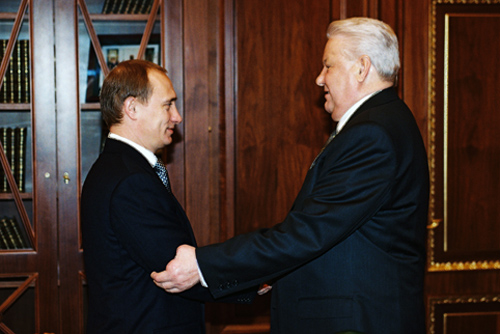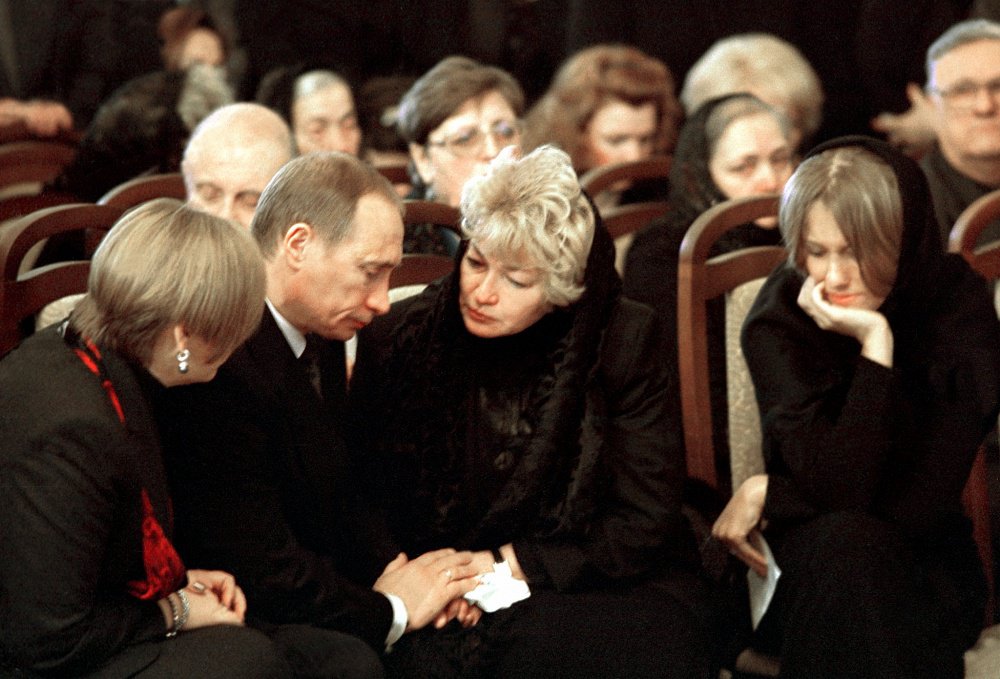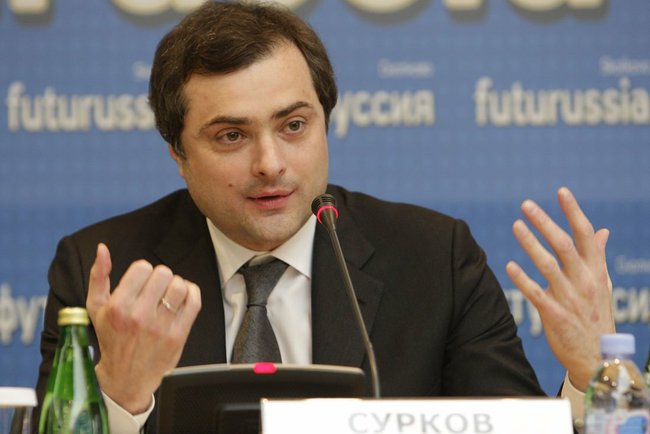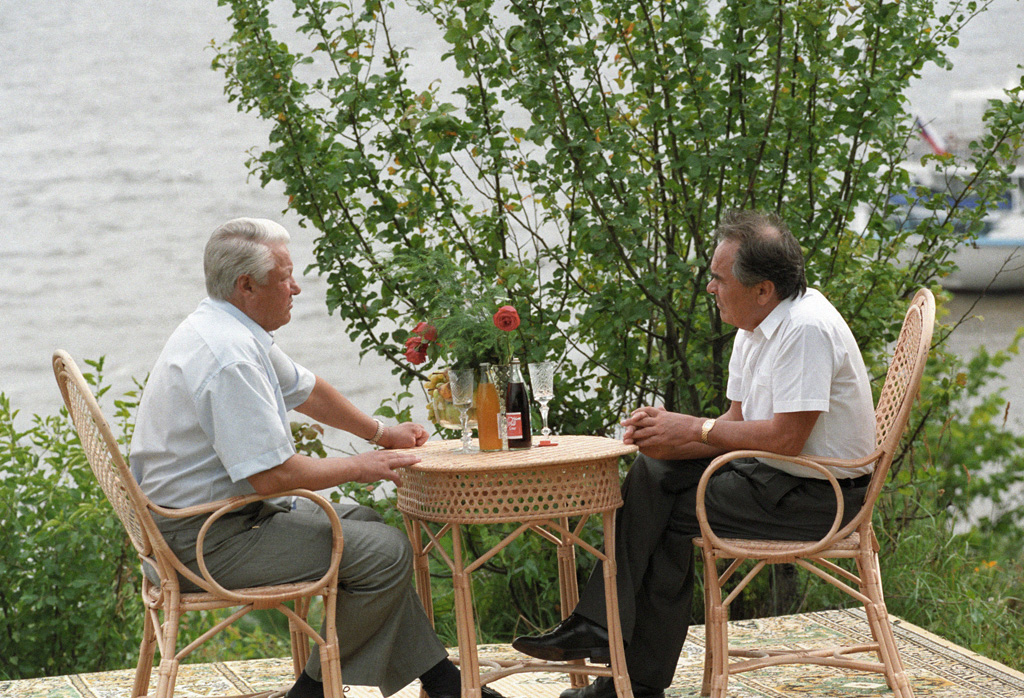|
Vladimir Putin 2000 Presidential Campaign
The 2000 presidential campaign of Vladimir Putin, Prime Minister of Russia, was announced on 13 January 2000, during his trip to Saint Petersburg. This campaign was first presidential campaign of Vladimir Putin. Background On 9 August 1999, Boris Yeltsin dismissed Prime Minister Sergei Stepashin and appointed Vladimir Putin as the new Prime Minister. On the same day, in his televised address, Yeltsin said that the best choice would be the election of Putin as President, in the election to be held in the summer of 2000. In December 1999, legislative elections were held and the Communist Party headed by Gennady Zyuganov won again. The second place was taken by the party Unity headed by Sergey Shoygu and supported by Vladimir Putin. Third place was taken by the party Fatherland - All Russia headed by former Prime Minister Yevgeny Primakov and Moscow Mayor Yury Luzhkov. In mid-1999, Primakov and Luzhkov were considered the frontrunners for the presidency. Both were critical of ... [...More Info...] [...Related Items...] OR: [Wikipedia] [Google] [Baidu] |
2000 Russian Presidential Election
Presidential elections were held in Russia on 26 March 2000.Dieter Nohlen & Philip Stöver (2010) ''Elections in Europe: A data handbook'', p1642 Incumbent prime minister and acting president Vladimir Putin, who had succeeded Boris Yeltsin after his resignation on 31 December 1999, was seeking a four-year term in his own right and won the elections in the first round. Background In spring 1998, Boris Yeltsin dismissed his long-time head of government, Viktor Chernomyrdin, replacing him with Sergey Kirienko. Months later, in the wake of the August 1998 economic crisis in which the government defaulted on its debt and devalued the rouble simultaneously, Kirienko was replaced in favor of Yevgeny Primakov. In May 1999, Primakov was replaced with Sergei Stepashin. Then in August 1999, Vladimir Putin was named prime minister, making him the fifth in less than two years.Riasanovsky, N., Steinberg, M. (2011). A History of Russia. Putin was not expected to last long in the role and was ... [...More Info...] [...Related Items...] OR: [Wikipedia] [Google] [Baidu] |
Yevgeny Primakov
Yevgeny Maksimovich Primakov (29 October 1929 – 26 June 2015) was a Russian politician and diplomat who served as Prime Minister of Russia from 1998 to 1999. During his long career, he also served as Foreign Minister, Speaker of the Supreme Soviet of the Soviet Union, and chief of the intelligence service. Primakov was an academician (Arabist) and a member of the Presidium of the Russian Academy of Sciences. Personal life Primakov was born in Kyiv in the Ukrainian SSR, and grew up in Tbilisi in the Georgian SSR. His father was Jewish and his family name was originally "Finkelstein", but was later changed to "Primakov". His father had been imprisoned in the Gulag during the Stalinist purges. His mother was Anna Yakovlevna Primakova, who worked as an obstetrician and was a cousin of the famous physiologist . He was educated at the Moscow Institute of Oriental Studies, graduating in 1953, and did postgraduate work at Moscow State University. His grandson is Yevgeny Primako ... [...More Info...] [...Related Items...] OR: [Wikipedia] [Google] [Baidu] |
Anatoly Sobchak
Anatoly Aleksandrovich Sobchak ( rus, Анатолий Александрович Собчак, p=ɐnɐˈtolʲɪj ɐlʲɪˈksandrəvʲɪtɕ sɐpˈtɕak; 10 August 1937 – 19 February 2000) was a Soviet and Russian politician, a co-author of the Constitution of the Russian Federation, the first democratically elected mayor of Saint Petersburg, and a mentor and teacher of future presidents Vladimir Putin and Dmitry Medvedev. Biography Soviet legal scholar Anatoly Sobchak was born in Chita, Russian SFSR, Soviet Union, on 10 August 1937. His father, Aleksander Antonovich, was a railroad engineer of Polish and Czech origin, and his mother, Nadezhda Andreyevna Litvinova, was an accountant of Russian and Ukrainian origin. Anatoly was one of four brothers. In 1939, the family moved to Uzbekistan, where Anatoly lived until 1953 before entering Stavropol Law College. In 1954, he transferred to Leningrad State University. In 1958, he married Nonna Gandzyuk, a student of Hertzen Teacher' ... [...More Info...] [...Related Items...] OR: [Wikipedia] [Google] [Baidu] |
Herman Gref
Hermann Gräf (russian: Герман Оскарович Греф, translit=German Oskarovich Gref, born February 8, 1964), better known as Herman Gref, is a Russian politician and businessman. He was the Minister of Economics and Trade of Russia from May 2000 to September 2007. He is the CEO and chairman of the executive board of Sberbank, the largest Russian bank. Education and early career Herman Gref was born in the Kazakh Soviet Socialist Republic (now Kazakhstan) into a family of German deportees who were exiled there in 1941. Later Gref was involved in the return of exiled Germans to Russia - with his assistance an entire German village called Strelna was built near St. Petersburg. There are two versions of what Gref did after graduation. According to one of them, Gref entered the faculty of international economic relations at MGIMO of the Ministry of Foreign Affairs of the USSR, but after the first year he was expelled from the university. According to the other version, ... [...More Info...] [...Related Items...] OR: [Wikipedia] [Google] [Baidu] |
Vladislav Surkov
Vladislav Yuryevich Surkov (russian: Владислав Юрьевич Сурков; born 21 September 1962 or 1964) is a Russian politician and businessman. He was First Deputy Chief of the Russian Presidential Administration from 1999 to 2011, during which time he was often viewed as the main ideologist of the Kremlin who proposed and implemented the concept of sovereign democracy in Russia. From December 2011 until May 2013, Surkov served as the Russian Federation's Deputy Prime Minister. After his resignation, Surkov returned to the Presidential Executive Office and became a personal adviser of Vladimir Putin on relationships with Abkhazia, South Ossetia and Ukraine. He was removed from this duty by presidential order in February 2020. Surkov is perceived by many to be a key figure with much power and influence in the administration of Vladimir Putin. According to ''The Moscow Times'', this perception is not dependent on the official title Surkov might hold at any one ti ... [...More Info...] [...Related Items...] OR: [Wikipedia] [Google] [Baidu] |
Alexander Abramov
Alexander Grigoryevich Abramov (russian: Александр Григорьевич Абрамов, born 1959) is a Russian businessperson, who until March 2022 was the Chairman of the Board of directors of Evraz, one of Russia's largest steel producers. Since 1998, he has amassed one of the largest steel and iron empire in Russia, which employed 71,591 people around the world, with steel output of 13,57 million tones and turnover of $14,1 billion in 2021, leading to him be widely considered a Russian oligarch. A business partner and ally of Aleksandr Frolov and Roman Abramovich, Abramov was in June 2021 listed by ''Forbes'' as having an estimated net worth of $8.0 billion. Early life and education Abramov was born in 1959 in Moscow, Russia, USSR. He is of Jewish descent. He graduated from the Moscow Institute of Physics and Technology with a degree in physics and mathematics. He first worked for Russia's space and defense program before becoming a metal trader after governm ... [...More Info...] [...Related Items...] OR: [Wikipedia] [Google] [Baidu] |
Viktor Cherkesov
Viktor Vasilyevich Cherkesov (russian: Виктор Васильевич Черкесов; 13 July 1950 – 8 November 2022) was a Russian security services official. Biography Cherkesov graduated from the Law Department of Leningrad State University in 1973. In 1975–1991, he worked in Leningrad and Leningrad Oblast Directorate of KGB and prosecuted political dissidents, including members of the Democratic Union. From 1992 to August 1998, Cherkesov led Saint Petersburg Directorate of MBR/FSK/ FSB, successor organization to KGB. From August 1998 to May 2000, he was a First Deputy Director of FSB under Vladimir Putin and Nikolai Patrushev. From 18 May 2000 to 11 March 2003, he was President Vladimir Putin's plenipotentiary envoy to the Northwestern Federal District. From 11 March 2003 until his death, he was head of the State Committee for the Control of the Circulation of Narcotic and Psychotropic Substances of the Russian Federation (since March 2004 – Federal Drug Con ... [...More Info...] [...Related Items...] OR: [Wikipedia] [Google] [Baidu] |
Alexey Podberezkin
Alexey Ivanovich Podberezkin (also: Podberyozkin; rus, Алексей Иванович Подберёзкин; born 7 February 1953) is a Russian politician, PhD in historical sciences, professor, member of Russian Academy of Sciences, member of Russian Academy of Military Sciences, president of the Russian-American University. Biography Podberezkin was born on 7 February 1953 in Moscow into a family of workers. He graduated from Moscow State Institute of International Relations in 1979 with a degree in International relations. In 1982, Alexey Podberezkin got his Advance Degree in military-political problems and international relations and gained reputation as an expert in USA military politics. Since 1981 to 1985, headed a group of consultants of the USSR Committee of Youth Organizations. In 1990, Podberezkin received Ph.D. in history. In 1994, founded the socio-political movement Spiritual Heritage, actively supporting the development of Russian science, culture, educatio ... [...More Info...] [...Related Items...] OR: [Wikipedia] [Google] [Baidu] |
Central Election Commission Of The Russian Federation
The Central Election Commission of the Russian Federation (russian: Центральная избирательная комиссия Российской Федерации, abbr. ЦИК, also Центризбирком) is the superior power body responsible for conducting federal elections and overseeing local elections in the Russian Federation founded in September 1993. It consists of 15 members. The President of Russia, State Duma and Federation Council of Russia each appoint five members. In turn, these members elect the Chairman, Deputy Chairman and Secretary. The Commission is in power for a four-year term. On 30 January 2007, amendments to the Russian election legislation, which would allow people without higher education in law to become members of the Central Election Commission, were passed by the President of Russia. History In 1917-1918 there was the All-Russian election commission for the Constituent Assembly, in the Far East in 1920-1922 - The Central El ... [...More Info...] [...Related Items...] OR: [Wikipedia] [Google] [Baidu] |
Viktor Zubkov
Viktor Alekseyevich Zubkov ( rus, Ви́ктор Алексе́евич Зубко́в, p=ˈvʲiktər ɐlʲɪˈksʲejɪvʲɪtɕ zʊpˈkof; born 15 September 1941) is a Russian civil servant, politician and businessman who served as the 36th Prime Minister of Russia from September 2007 to May 2008. He was Vladimir Putin's First Deputy Prime Minister during the presidency of Dmitry Medvedev. A civil servant who held various positions in the Leningrad Oblast under the Soviet regime, he later served as advisor to Cabinet Ministers. Zubkov was a financial crime investigator until he was nominated on 12 September 2007 by President Vladimir Putin to replace Prime Minister Mikhail Fradkov, who had resigned earlier that day. The nomination was approved in the Duma on 14 September 2007. On 7 May 2008 Zubkov's cabinet was automatically dismissed. This procedure, following an inauguration of the President of Russia is required by the Russian Constitution. After Putin became Prime Minist ... [...More Info...] [...Related Items...] OR: [Wikipedia] [Google] [Baidu] |
Sergey Mironov
Sergey Mikhailovich Mironov (russian: Серге́й Миха́йлович Миро́нов; born 14 February 1953) is a Russian politician. He was Chairman of the Federation Council, the upper house of the Russian parliament, from 2001 to 2011. He leads the faction A Just Russia in the Parliament of Russia. Life and career In 1967 he joined the Komsomol. In the 1970s, Sergey Mironov served in the airborne troops in the Soviet Army. In 1973 he was elected as deputy secretary committee of the Komsomol on ideological educational work at the Leningrad Mining Institute. After graduating from the Institute he worked as an engineer-geophysicist. After a brief time of working as an entrepreneur, he entered politics and, in 1994, was elected deputy of the St. Petersburg Legislative Assembly. In June 2000, he was elected vice-Chairman of the St. Petersburg Legislative Assembly and, in 2001, entered the Federation Council of Russia as a representative of St. Petersburg. In Decembe ... [...More Info...] [...Related Items...] OR: [Wikipedia] [Google] [Baidu] |
Mintimer Shaimiev
Mintimer Sharipovich Shaimiev ( tt-Cyrl, Минтимер Шәрип улы Шәймиев, translit=Mintimer Şärip ulı Şäymiev; russian: Минтиме́р Шари́пович Шайми́ев; born January 20, 1937) is a Russian former politician who served as the president of Tatarstan from 1991 to 2010. He was re-elected president in 1996, 2001, and 2005. Biography Shaimiev was born in the village of Anyakovo, in Aktanyshsky District of the Tatar ASSR. He graduated from the Kazan Agricultural Institute in 1959, and worked as an agricultural engineer. He joined the Communist Party in 1963. In 1967 he was an instructor and deputy head of the agricultural department at Tatarstan's regional party organization. In 1969 Shaimiev was appointed Minister for Amelioration and Water Economy of his republic and in 1983 he became the first deputy chair of the Tatar Council of Ministers. In September 1989 Shaimiev became first secretary of Tatarstan's Communist Party organization. ... [...More Info...] [...Related Items...] OR: [Wikipedia] [Google] [Baidu] |







